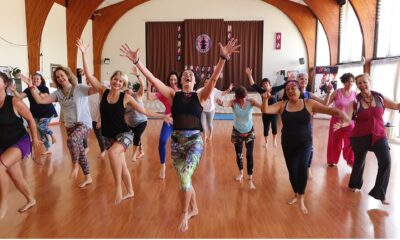
Featured Item

War turns mental health into a battle zone
It’s one of those days when you’ll always remember where you were when it happened, like the release of Nelson Mandela or the day you heard about the COVID-19 lockdown. Since Israel was brutally infiltrated on 7 October 2023 by bloodthirsty Hamas terrorists intent on killing every Jew they could find – sorry, not just killing, but mutilating, raping, maiming, burning, torturing, and murdering Jewish civilians and children and kidnapping hostages, Jews globally have been struggling with their mental health.
I was in Cape Town on holiday with my family when I heard, and my first thought was, “How could this possibly happen? Israel has excellent defence systems in place; the top army in the world. This simply can’t be true!” As a Jew married to an Israeli whose nephews and nieces are serving in the Israel Defense Forces, this news hit brutally hard. Not to mention how my other teen nephew at boarding school in Israel would get home safely during a war.
But my story isn’t unique. We all have ties. And as such a tiny population group, we’re all in this together, experiencing collective – and individual – trauma to greater or lesser degrees. Disbelief soon gave way to sadness, grief, and anger. A noxious mixture of shock, disgust, and absolute abhorrence at humankind settled over me and every Jew I know, like a layer of black, heavy soot, clouding every day since then.
Feelings that have surfaced include fear, sadness, despair, depression, and rage. Friends whose mental health was teetering on the edge before 7 October had fully fledged breakdowns. In my own life, on some days, it’s been difficult even to have the resources to converse with others and interact with the world with a clear perspective. Suffering surrounds us. Grief is exhausting. Fear is energy-draining.
On Maslow’s hierarchy of needs, personal safety is paramount to mental health. Our sense of safety as a people has vanished. If we’re not safe in our spiritual homeland established post-Holocaust, then where, indeed, can we be safe? In South Africa, a country where Jews have been an integral and important part of society, the anti-apartheid movement, and in building our democracy, the betrayal of the South African government, which unashamedly consorts with and openly supports Hamas, is a bloody knife in the heart.
Unfortunately, much of the world’s damnation, disparaging, criticising, and judging of Israel’s defensive actions, leads us again as a tribe to feel persecuted, misunderstood, vilified as perpetrators and not the victims of heinous crimes against humanity. The messaging that somehow, Jews deserve what’s happened is very damaging to the psyche. It triggers the overwhelming epigenetic trauma that we carry, being expelled so many times in history and of course, most recently during the Holocaust, when Hitler tried to exterminate us completely – the same as Hamas’s caliphate. For my friend’s mother, a Holocaust survivor who always keeps a small suitcase packed – just in case – this is utterly agonising.
What’s happening across the world leaves us incredulous. It rocks the very foundation of our mental stability. Good and evil have been subverted. It’s topsy turvy, reminiscent of being trapped in the upside-down world of Stranger Things. Except, the horrifying alien to be defeated is the belief that the world and its people are inherently haters of Jews – this can torment and cripple us psychologically. Is it even safe to wear our Magen David in public? What kind of world do we live in where we need to hide our religion for fear of recrimination … or worse?
The increase in antisemitic incidents, violence, riots, protests, and marches against Israel and Jews is frightening. It feels like those who were always latently antisemitic have been given full permission to voice their prejudice without consequence. All the trolls have come out with vitriolic glee to play on social media. Everywhere you turn, there’s an echo chamber of hatred. The oversaturation of information is self-defeating: the need to know everything isn’t necessary. It simply overwhelms and in real terms, changes absolutely nothing.
How can we make a tangible difference? By looking after our mental health, regulating our trauma response downwards, supporting each other, reducing stress – however you choose to do that – and regulating ourselves so that we can act and respond to life from a sage perspective, our higher nature, not from the primitive brain where we fear for our lives, are in chronic fight-and-flight mode, and are simply trying to survive.
If we allow our emotional health to be vanquished, then the haters, the terrorists, and the antisemites win. The Jewish people will triumph. We need to continue to raise our vibrations, spiritual and otherwise. Our light mustn’t be extinguished, it must shine brighter so it can illuminate the darkness.
Top tips for mental health
- Limit social media with discipline: confine yourself to a few reliable sources to look at once or twice a day;
- Donate to those in need and perform acts of charity. Taking action makes us feel less disempowered;
- Take space from people who perhaps don’t understand where you’re at;
- Process your painful emotions but don’t get stuck in them;
- Set boundaries in place for conversations, memes, and messages about the war and Israel. Avoid known triggers;
- Locate a sense of peace and centrededness within: whether it’s through prayer, meditation, kindness, or faith, seek serenity;
- Practice self-care with gentleness and compassion towards yourself and others;
- Support and check in with each other through actions, words, and gestures – reach out;
- Get enough quality sleep of at least eight hours per night;
- Do things that make you happy each day;
- Relieve stress through exercise and creative hobbies;
- Engage in life and work with meaning and purpose;
- Look for glimmers: small moments that spark joy or peace, which can help cue our nervous system to feel safe or calm;
- Practice gratitude. There’s always much to be thankful for;
- Avoid allowing anger and sadness to detract from happy events and the beauty in your life;
- Learn to let go of worries and anxiety. There are many tools for this such as breathwork;
- Seek professional help from therapists and coaches if needed.
- Nikki Temkin is a prolific editor, author, and journalist. She’s also an accredited functional life and wellness coach offering private and workplace talks, workshops, and coaching around stress management and optimal mental, physical, and emotional well-being.










